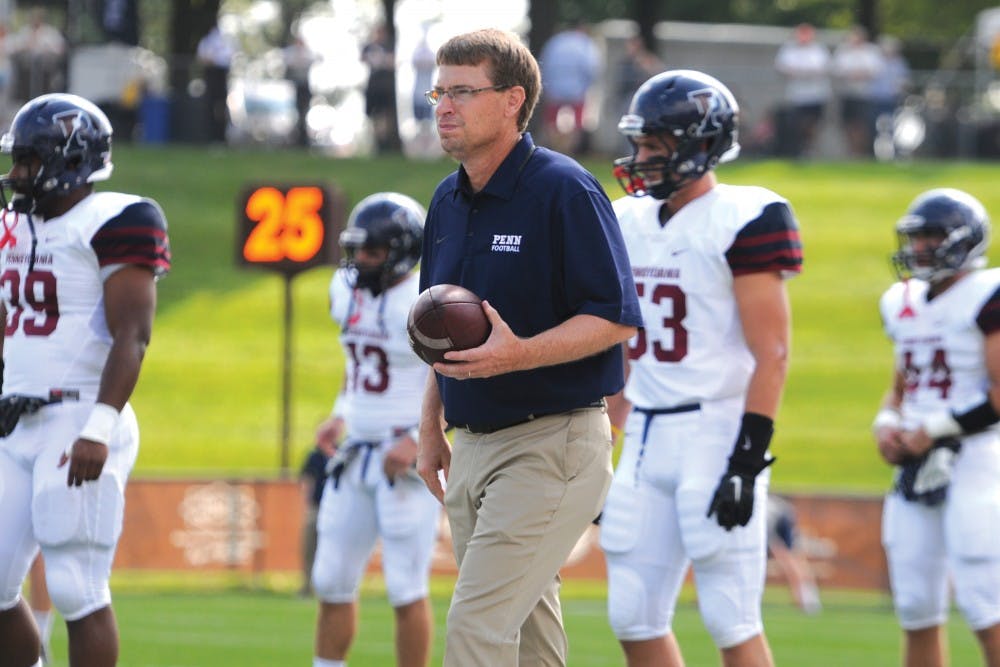
Defensive coordinator Bob Benson has helped work with a former player to get Penn football's recent initiative relating to Castleman disease off the ground.
Winning percentage isn’t the only thing Penn football is raising in Ray Priore’s first year at the helm.
Led by junior linebacker Sam Tullman, the Quakers have started a chapter within Uplifting Athletes, an organization comprised of 24 Division I football programs, each working to boost awareness and research funding for diseases. Individually, the Red and Blue are raising money for the Castleman Disease Collaborative Network, co-founded by Penn School of Medicine professor David Fajgenbaum.
“Between Vhito [DeCapria, a 4-year-old cancer survivor serving as the team’s honorary captain] and this, there’s a lot of extra motivation,” Tullman said. “It’s fun when everybody’s winning and we’re having success, but, in addition, you’re possibly saving lives.”
To fully comprehend why Penn chose Castleman disease, which only has an estimated 6,500 annual cases in the United States, one must take a trip back to the mid-2000s, when Fajgenbaum was a quarterback for Georgetown under then-head coach Bob Benson.
“Like any player-coach relationship, we developed a pretty close bond,” Benson — who is now the Quakers’ defensive coordinator — said about Fajgenbaum, a 2006 All-USA College Academic first team selection. “Sadly his mom passed away, and we experienced that grief together.”
Although they went their separate ways after Benson left Georgetown and Fajgenbaum graduated as a Rhodes Scholar, the two stayed in touch through social media. But things took a turn for the worse in 2010.
Fajgenbaum, then a Penn medical school student, was diagnosed with Castleman disease, an illness with a 35 percent mortality rate that he described as “the immune system attacking the organs.”
However, since staring death in the face and even being read his last rites in November 2010, Fajgenbaum has responded strongly, starting the CDCN in 2012, earning an MBA from Wharton after medical school and being named to Forbes’ “30 Under 30” in health care in 2015.
“He’s always been an inspiration to me,” Benson said. “One of the most courageous people I’ve ever met.”
Consequently, when Benson — who had coached with Priore at Albany in 1986 — was hired last winter, he and Fajgenbaum were finally reunited, helping facilitate Penn’s initiation into Uplifting Athletes as the latter continues his battle.
“When I found out that he was coming to Penn, I was so excited, because he’s such a great leader, and I’d get a chance to reconnect with him,” Fajgenbaum said. “When I told him about the work I’m doing to take down Castleman disease, he immediately asked how he could help.”
Fajgenbaum spoke with players during the summer, and the rest was history.
“I got a chance to meet Sam, [junior defensive lineman] Tyrone [Quarterman] and Hendo [junior defensive back Matt Henderson], and I loved seeing the motivation in their eyes,” Fajgenbaum said. “I then spoke with the whole team, and it was clear that this was a really good group of guys.
“I came to them needing their help, and they stepped up.”
Currently, the fundraising system involves donors pledging custom amounts to CDCN for either offensive touchdowns or defensive turnovers in Ivy League games. As of Saturday’s win at Brown, the donations were at approximately $184 per touchdown and $82 per turnover.
Of course, this method depends on the success of Penn’s on-the-field product. And the Quakers have held up their end of the bargain, already securing 33 touchdowns and 19 turnovers through seven games — both higher than their marks of 26 and 14, respectively, from all of 2014.
“The players are starting to get confident, understand the system and they are responding,” Benson said. “We’re a disguised pressure defense that wants to force turnovers, and it’s great along the way that we can help someone like Dave.”
Overall, Tullman estimated that the team would raise at least $8,000 during the season.
“As we break it down and figure out how this disease works, we will save lives,” Fajgenbaum said. “But you can’t do that unless there’s funding for research.”
Although only three games remain in 2015, Tullman already has some ideas cooking for the team’s next fundraising tactic.
“We’re trying to reach out even more across campus, hoping to get some fraternity or sorority support,” he said. “We’ll be doing another event related to spring training since we definitely want to continue our success.”
Ultimately, even as Fajgenbaum approaches 22 months since his most recent relapse — his longest stretch since being diagnosed — there’s more work to be done.
“We’ve already been benefitting from the research, but I still live in a constant state of fear, so I just cherish every day so much,” Fajgenbaum said. “As optimistic as I am about the progress we’ve made, I live trying to make the most of every single second to try to win this battle.”
With Tullman, Benson and the Penn community behind him, he won’t be fighting alone.
The Daily Pennsylvanian is an independent, student-run newspaper. Please consider making a donation to support the coverage that shapes the University. Your generosity ensures a future of strong journalism at Penn.
DonatePlease note All comments are eligible for publication in The Daily Pennsylvanian.






